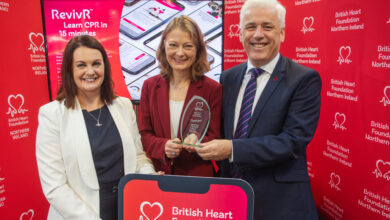Mental health standards
 People with mental illness should expect a high quality of care and treatment from the Health Service, based on the service framework. agendaNi reviews its standards.
People with mental illness should expect a high quality of care and treatment from the Health Service, based on the service framework. agendaNi reviews its standards.
Northern Ireland’s service framework for mental health was published in 2011 to outline the quality of service that a person experiencing mental illness should receive from the health and social care system.
To improve and promote health (in general), the Health Service discourages smoking and substance abuse and encourages healthy eating and physical activity. Educationalists identify children who need extra support during their school years.
A person who uses mental health services should be “actively involved” in the planning, delivery and monitoring of their treatment and care – and the services should be focused on recovery.
Carers should be given the opportunity to be involved in the planning and delivery of services and also receive information, advice and support that is relevant, including a carers assessment.
Advocacy services should be available to people using specialist mental health services who may not be able to articulate their views clearly. Communication by staff should be effective and take place “in a timely manner”.
When possible, the standards expect a person with complex mental health needs to be treated and supported “in the community and in their own home”. A person who is experiencing a significant mental health crisis should have “timely access” to health and social care services, designed according to their age, 24 hours a day and seven days per week.
Service users should also have a role in preparing their care plan, which must allow for urgent access to specialist services (if required) and identify the needs of their children and other relatives (where relevant).
Medication, where it is appropriate, should be prescribed in accordance with local and national guidelines with carers and health professionals informing them about how this should be taken.
The standards also emphasise the need to train health and social care staff in how to identify the signs of violence, abuse and neglect, and ensure that they know how to contact the lead person for child protection and adult safeguarding within their organisation.
Conditions
Conduct disorders, depression and attention deficit hyperactivity disorder (ADHD) are prioritised in the standards for children and young people. Each standard calls for comprehensive assessments of the child and referrals to appropriate therapies. Anti-depressant medication should not be offered to children unless this is required alongside other psychological interventions.
The transition to adulthood – around the age of 18 – is an important phase for a young person who has a significant mental health problem. In the three to six months before they turn 18, health professionals should assess the young person, identify what further services are required and make arrangements for how they start to receive services as an adult. These arrangements should be “reviewed until successful” and planned with input from the young person and their family and carers.
 Where a person is experiencing mild to moderate anxiety and/or depression, he or she should receive an early assessment of their psychological, physical, clinical and social care needs at primary care level. Interventions should be “low intensity” and last for the short term.
Where a person is experiencing mild to moderate anxiety and/or depression, he or she should receive an early assessment of their psychological, physical, clinical and social care needs at primary care level. Interventions should be “low intensity” and last for the short term.
If the depression is identified as moderate to severe, the person should be referred to a mental health specialist for a risk assessment. The same approach is recommended for first episode psychosis. Schizophrenia should be treated with psychotropic medication (for the central nervous system) and psychological therapies as appropriate.
A person who presents with obsessive compulsive disorder should be referred to a mental health specialist who can identify any risks, the presence of obsessions and compulsions, and any resulting impairment. Those with bipolar disorder should also receive a risk assessment.
In cases of drug or alcohol misuse, the person should be encouraged to fully participate in their assessment and their referral to other services, if necessary.
Prompt access to therapy and medical interventions is emphasised for people with eating disorders, including medical monitoring, initial supportive management, psychological therapies, dietetics, occupational therapy and physiotherapy. People with dementia and their carers should receive a regular review of their physical and mental health needs.
Groups
All pregnant women should be asked about past or present mental illness and treatment at various stages of their pregnancy and up to one year after birth.
A person with a severe and enduring mental illness should be reviewed as they approach the age of 65 to assess whether adult or older people’s mental health services are more appropriate for them.
Northern Ireland has the highest incidence of post-traumatic stress disorder (PTSD) in Western Europe. Most people over the age of 25 have some memory of the Troubles and the Commission for Victims and Survivors estimates that 5-8 per cent of the population may have symptoms of PTSD.
People with confirmed PTSD should have access to “timely” psychological and social interventions, medication and treatment, delivered by “suitably qualified and supervised practitioners.” The regional approach to treating personality disorder is reaffirmed. This was first outlined in the personality disorder strategy, published in June 2010.
A co-ordinated comprehensive range of services is required for people who contemplate or carry out self-harm or have suicidal tendencies. This should include advice, information, counselling and support, including a list of sources of help for the person and their family, carers and friends.
Self-harm injuries need to be dealt with as a matter of urgency with the person also receiving an initial mental health assessment. Where a risk – to themselves or others – is identified, the person should be referred immediately to a specialist.
Support for people with neurological or brain injuries should include residential options and specialist inpatient mental health services, focused on rehabilitation.
Deaf people should also be able to receive a full range of mental health services, including access to a key worker, inpatient care and out-of-hours services if required. The standards state that a transgendered person should have hormone treatment and peer support and mentoring in order to improve their self-image.
The department states that offenders with mental disorders should have access to the full range of services and interventions available to the general population.
People with learning disabilities should also have appropriate support. Services for ethnic minorities should be sensitive to their specific cultural needs. Health and social care staff are encouraged to work with other government agencies and the voluntary sector to ensure that homeless people also receive a “comprehensive” mental health service.





